
bots
Programming bots to play video games
Stars: 179
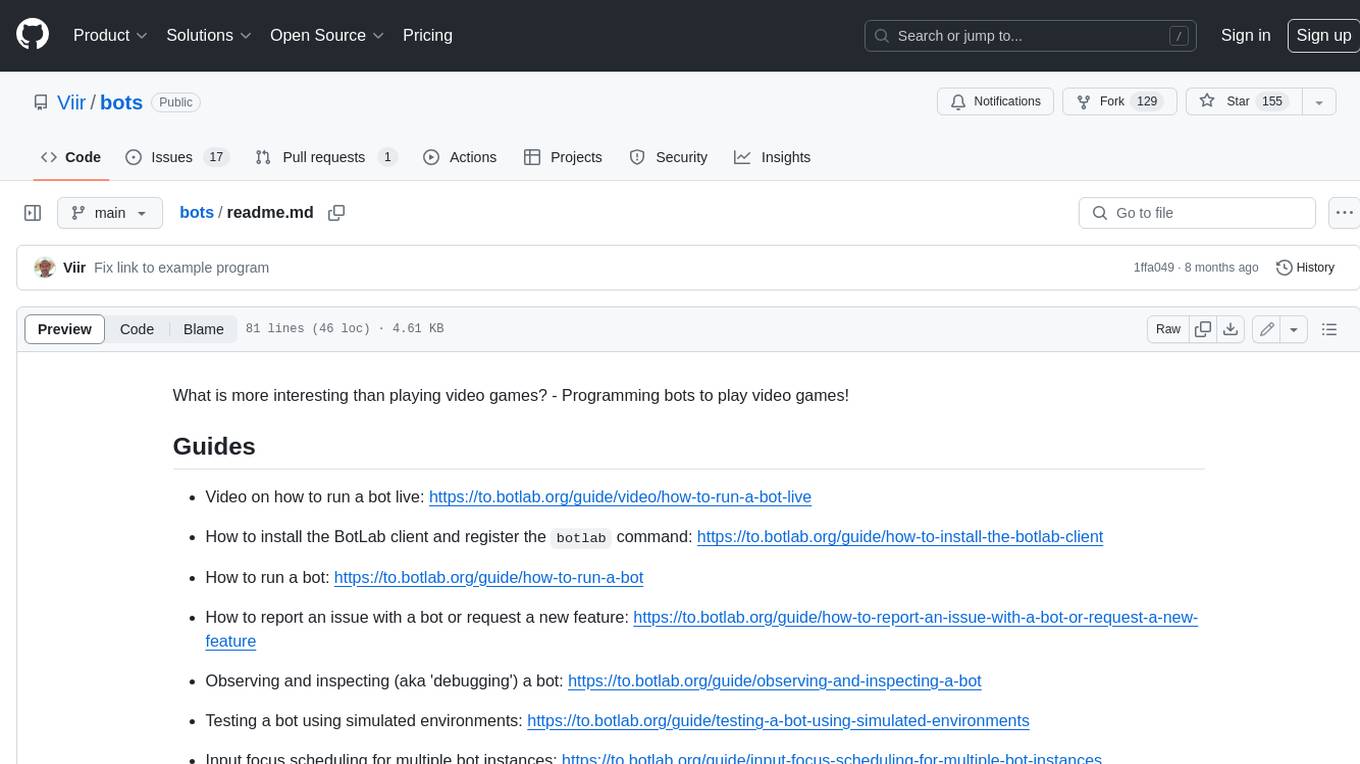
The 'bots' repository is a collection of guides, tools, and example bots for programming bots to play video games. It provides resources on running bots live, installing the BotLab client, debugging bots, testing bots in simulated environments, and more. The repository also includes example bots for games like EVE Online, Tribal Wars 2, and Elvenar. Users can learn about developing bots for specific games, syntax of the Elm programming language, and tools for memory reading development. Additionally, there are guides on bot programming, contributing to BotLab, and exploring Elm syntax and core library.
README:
What is more interesting than playing video games? - Programming bots to play video games!
-
Video on how to run a bot live: https://to.botlab.org/guide/video/how-to-run-a-bot-live
-
How to install the BotLab client and register the
botlabcommand: https://to.botlab.org/guide/how-to-install-the-botlab-client -
How to run a bot: https://to.botlab.org/guide/how-to-run-a-bot
-
How to report an issue with a bot or request a new feature: https://to.botlab.org/guide/how-to-report-an-issue-with-a-bot-or-request-a-new-feature
-
Observing and inspecting (aka 'debugging') a bot: https://to.botlab.org/guide/observing-and-inspecting-a-bot
-
Testing a bot using simulated environments: https://to.botlab.org/guide/testing-a-bot-using-simulated-environments
-
Input focus scheduling for multiple bot instances: https://to.botlab.org/guide/input-focus-scheduling-for-multiple-bot-instances
-
Running bots on multiple game clients: https://to.botlab.org/guide/running-bots-on-multiple-game-clients
-
[Walkthrough, Programming, Video] Combining behaviors of multiple bot programs: https://youtu.be/ALXsLznDOfM
-
Learn how to develop EVE Online bots and intel tools. Discover the engineering methods and tools behind the most advanced bots: https://to.botlab.org/guide/developing-for-eve-online
-
Syntax of the Elm programming language: https://elm-lang.org/docs/syntax
-
Elm programming language - forward pipe (
|>) and function composition (>>) operators: https://to.botlab.org/guide/elm-programming-language-forward-pipe-and-function-composition-operators -
Learning Elm? Download the Elm Cheat Sheet to support you during the learning process: https://github.com/lucamug/elm-cheat-sheet/
-
Get a guide for writing Elm code that reads from the EVE Online game client's user interface: Using types from the parsed user interface: https://to.botlab.org/guide/parsed-user-interface-of-the-eve-online-game-client
-
Inspect the UI tree of an EVE Online game client process (live or from archived samples): https://to.botlab.org/guide/alternate-ui-for-eve-online
-
[Programming]: Adding a counter to a bot: https://forum.botlab.org/t/i-would-like-to-use-survey-scanner-for-every-even-numbers-of-targets-targetted/3807
-
[Walkthrough, Programming]: Making an EVE Online bot see anomalies and other pilots: https://vimeo.com/526817258
-
How to collect samples for 64-bit memory reading development: https://to.botlab.org/guide/collect-samples-for-memory-reading-development
-
Syntax highlighting of code blocks - How to format code on the forum: https://forum.botlab.org/t/syntax-highlighting-of-code-blocks-how-to-format-code-on-the-forum/738
-
BotLab Contributor Program: https://to.botlab.org/guide/botlab-contributor-program
Wondering what outcome you can expect from following the guides? Below is a list of example bots. You can test them for free:
-
EVE Online warp-to-0 autopilot
-
EVE Online mining bot
-
EVE Online combat anomaly bot
-
Tribal Wars 2 farmbot
-
Elvenar bot
- Learn to make online games using the Elm programming language: https://github.com/onlinegamemaker/making-online-games
-
Use an integrated development environment to test your Elm code: https://elm-editor.com
-
Explore Elm syntax and core library with the Elm Explorer: https://botlabs.blob.core.windows.net/blob-library/by-name/ElmExplorer.html
-
Inspection tool to explore the structure of EVE Online memory readings: https://botlabs.blob.core.windows.net/blob-library/by-name/2023-06-21-eve-online-alternate-ui.html
-
How to Allow Multiple RDP Sessions in Windows 10: https://woshub.com/how-to-allow-multiple-rdp-sessions-in-windows-10/
For Tasks:
Click tags to check more tools for each tasksFor Jobs:
Alternative AI tools for bots
Similar Open Source Tools

bots
The 'bots' repository is a collection of guides, tools, and example bots for programming bots to play video games. It provides resources on running bots live, installing the BotLab client, debugging bots, testing bots in simulated environments, and more. The repository also includes example bots for games like EVE Online, Tribal Wars 2, and Elvenar. Users can learn about developing bots for specific games, syntax of the Elm programming language, and tools for memory reading development. Additionally, there are guides on bot programming, contributing to BotLab, and exploring Elm syntax and core library.
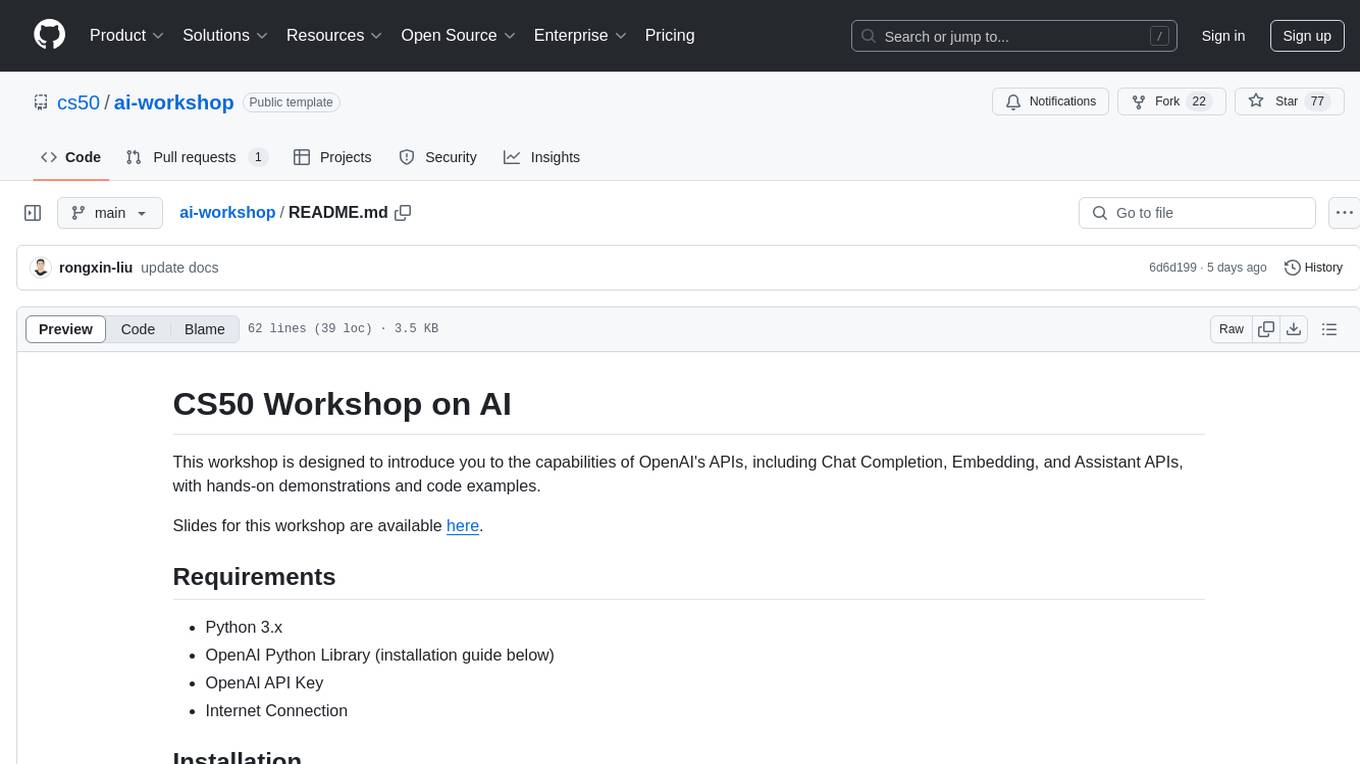
ai-workshop
The AI Workshop repository provides a comprehensive guide to utilizing OpenAI's APIs, including Chat Completion, Embedding, and Assistant APIs. It offers hands-on demonstrations and code examples to help users understand the capabilities of these APIs. The workshop covers topics such as creating interactive chatbots, performing semantic search using text embeddings, and building custom assistants with specific data and context. Users can enhance their understanding of AI applications in education, research, and other domains through practical examples and usage notes.

devika
Devika is an advanced AI software engineer that can understand high-level human instructions, break them down into steps, research relevant information, and write code to achieve the given objective. Devika utilizes large language models, planning and reasoning algorithms, and web browsing abilities to intelligently develop software. Devika aims to revolutionize the way we build software by providing an AI pair programmer who can take on complex coding tasks with minimal human guidance. Whether you need to create a new feature, fix a bug, or develop an entire project from scratch, Devika is here to assist you.
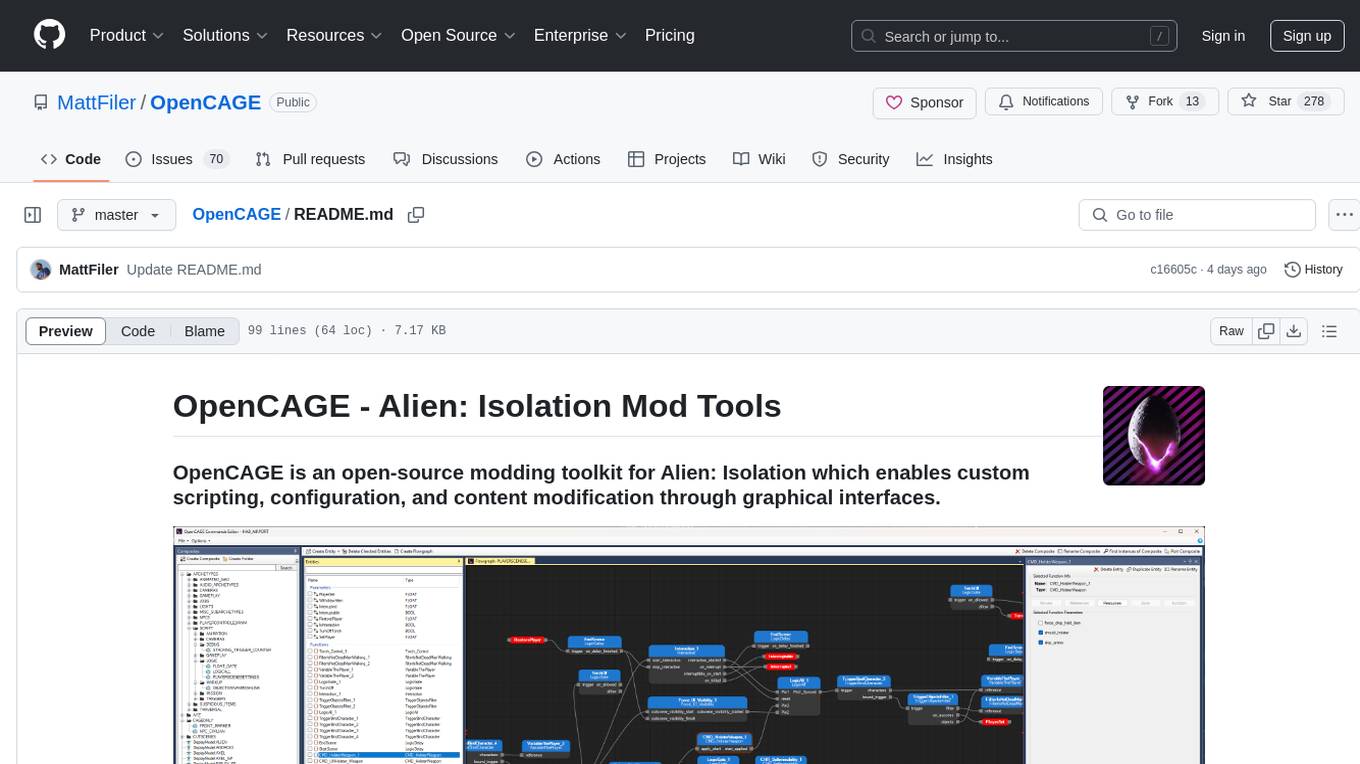
OpenCAGE
OpenCAGE is an open-source modding toolkit for Alien: Isolation, enabling custom scripting, configuration, and content modification through graphical interfaces. It includes tools for editing assets, configurations, scripts, behaviour trees, launching the game, and managing backups. The project is constantly evolving with a roadmap that includes features like contextual script editing, content porter, new level creator, mod installers, 3D viewer improvements, navmesh generation, skinned meshes support, sound import/export, and more. OpenCAGE is supported financially by the community and welcomes code contributions.
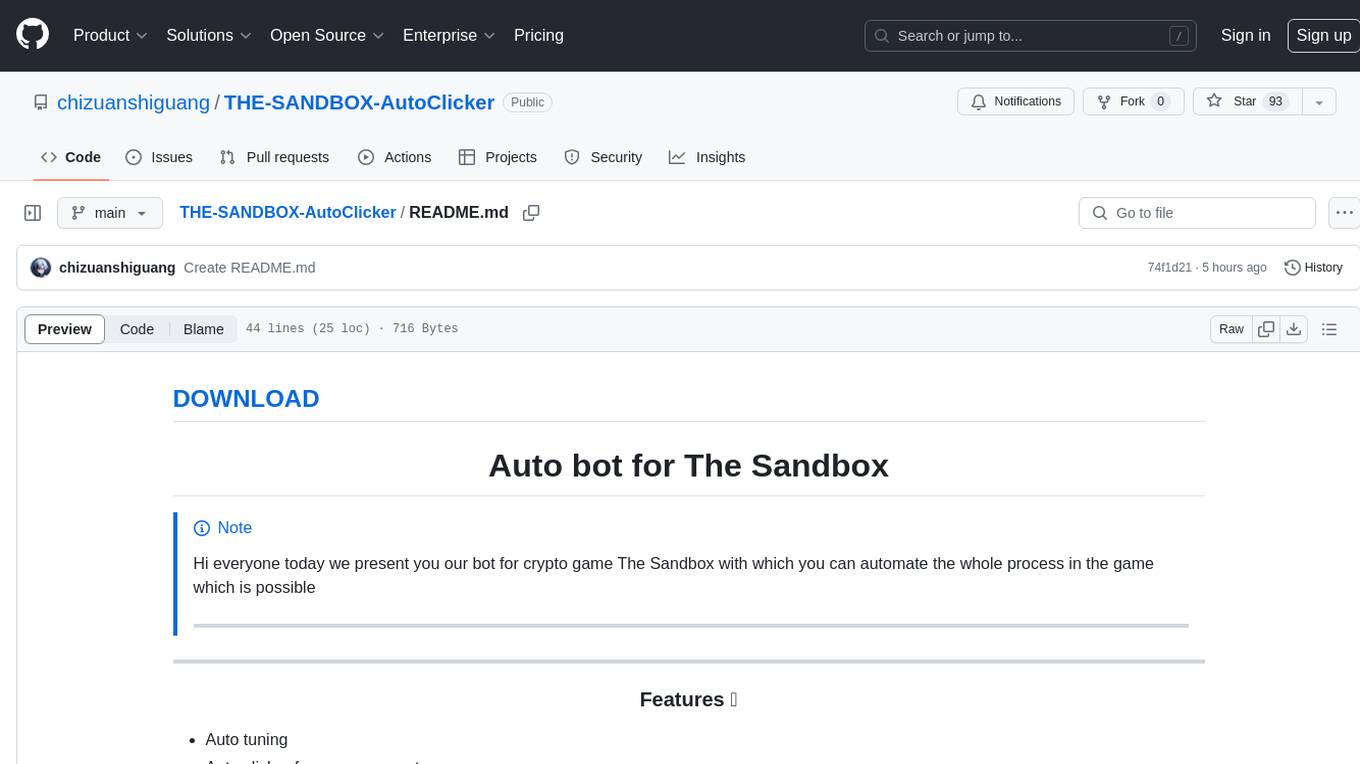
THE-SANDBOX-AutoClicker
The Sandbox AutoClicker is a bot designed for the crypto game The Sandbox, allowing users to automate various processes within the game. The tool offers features such as auto tuning, multi-account auto clicker, multi-threading, a convenient menu, and free proxies. It provides full optimization through a simple menu and is guaranteed to be safe for Windows systems, supporting versions 7/8/8.1/10/11 (x32/64).
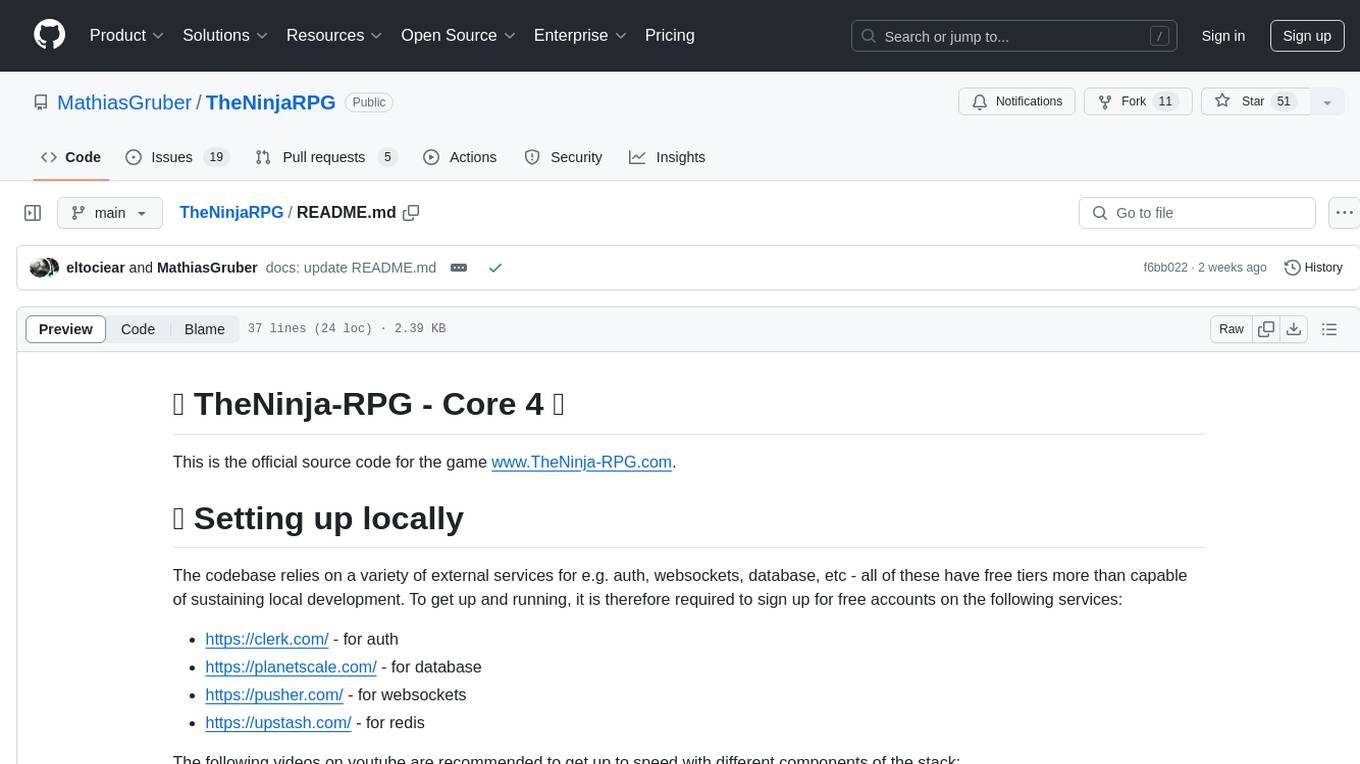
TheNinjaRPG
TheNinja-RPG is the official source code for the game www.TheNinja-RPG.com. It relies on external services for authentication, websockets, and database. The setup involves signing up for free accounts on services like Clerk, Planetscale, Pusher, and Upstash. The project is bootstrapped using VScode devcontainer and docker for easy setup. Various make commands are available for local development. The source code is released with no license to protect its exclusivity.
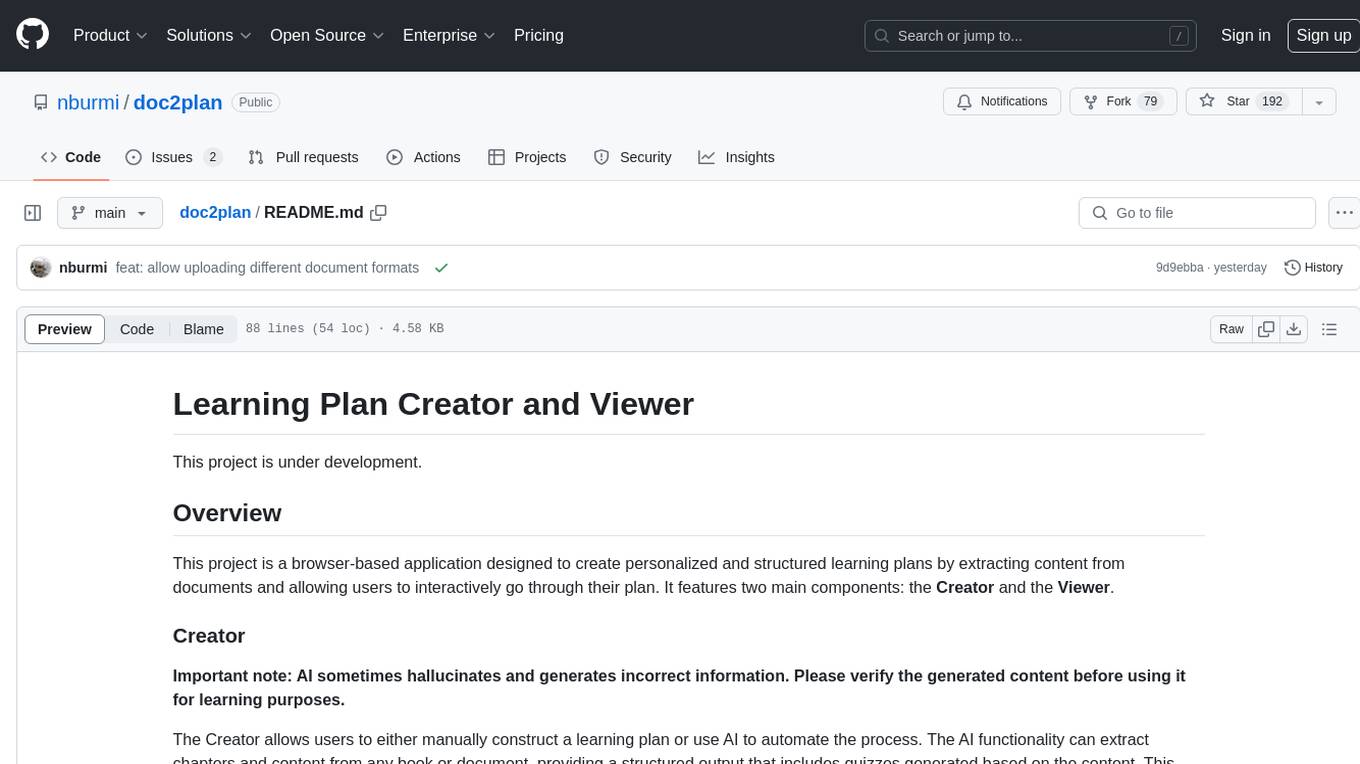
doc2plan
doc2plan is a browser-based application that helps users create personalized learning plans by extracting content from documents. It features a Creator for manual or AI-assisted plan construction and a Viewer for interactive plan navigation. Users can extract chapters, key topics, generate quizzes, and track progress. The application includes AI-driven content extraction, quiz generation, progress tracking, plan import/export, assistant management, customizable settings, viewer chat with text-to-speech and speech-to-text support, and integration with various Retrieval-Augmented Generation (RAG) models. It aims to simplify the creation of comprehensive learning modules tailored to individual needs.
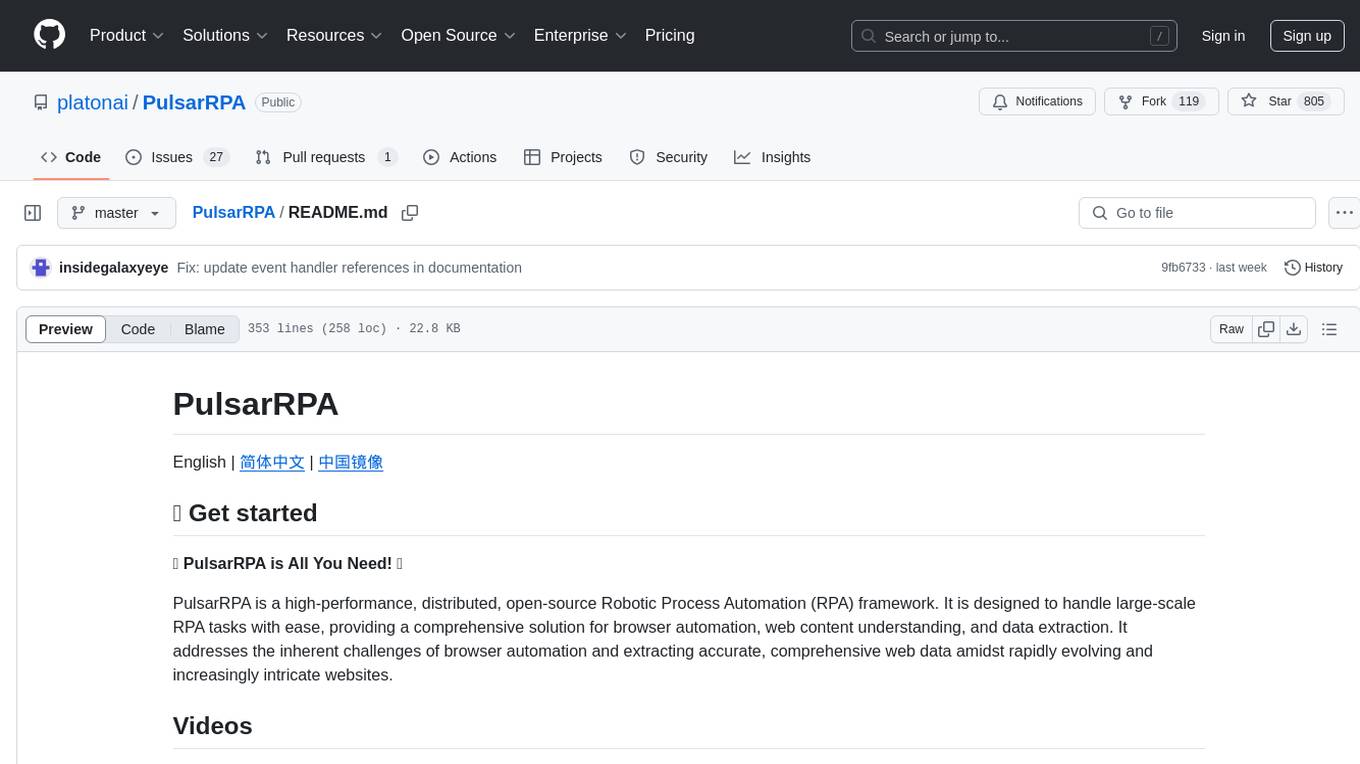
PulsarRPA
PulsarRPA is a high-performance, distributed, open-source Robotic Process Automation (RPA) framework designed to handle large-scale RPA tasks with ease. It provides a comprehensive solution for browser automation, web content understanding, and data extraction. PulsarRPA addresses challenges of browser automation and accurate web data extraction from complex and evolving websites. It incorporates innovative technologies like browser rendering, RPA, intelligent scraping, advanced DOM parsing, and distributed architecture to ensure efficient, accurate, and scalable web data extraction. The tool is open-source, customizable, and supports cutting-edge information extraction technology, making it a preferred solution for large-scale web data extraction.
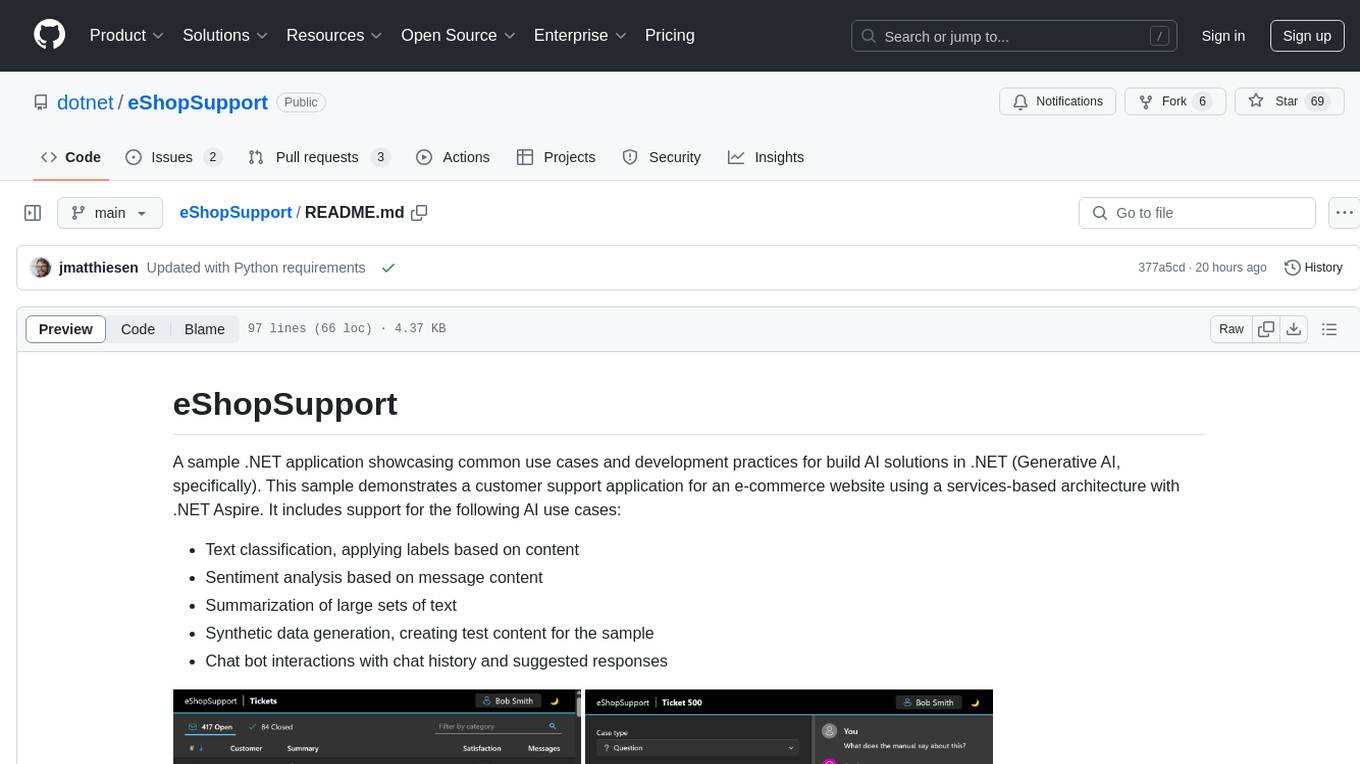
eShopSupport
eShopSupport is a sample .NET application showcasing common use cases and development practices for building AI solutions in .NET, specifically Generative AI. It demonstrates a customer support application for an e-commerce website using a services-based architecture with .NET Aspire. The application includes support for text classification, sentiment analysis, text summarization, synthetic data generation, and chat bot interactions. It also showcases development practices such as developing solutions locally, evaluating AI responses, leveraging Python projects, and deploying applications to the Cloud.
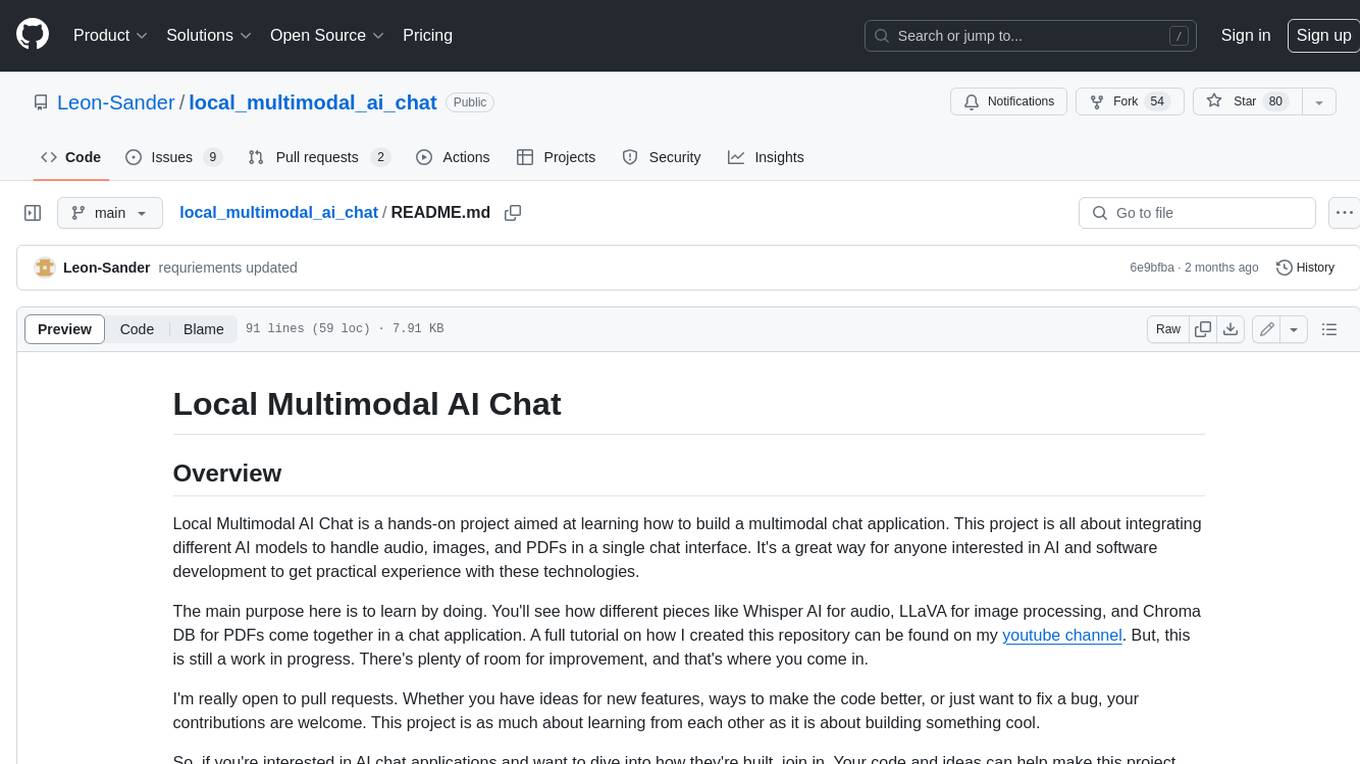
local_multimodal_ai_chat
Local Multimodal AI Chat is a hands-on project that teaches you how to build a multimodal chat application. It integrates different AI models to handle audio, images, and PDFs in a single chat interface. This project is perfect for anyone interested in AI and software development who wants to gain practical experience with these technologies.
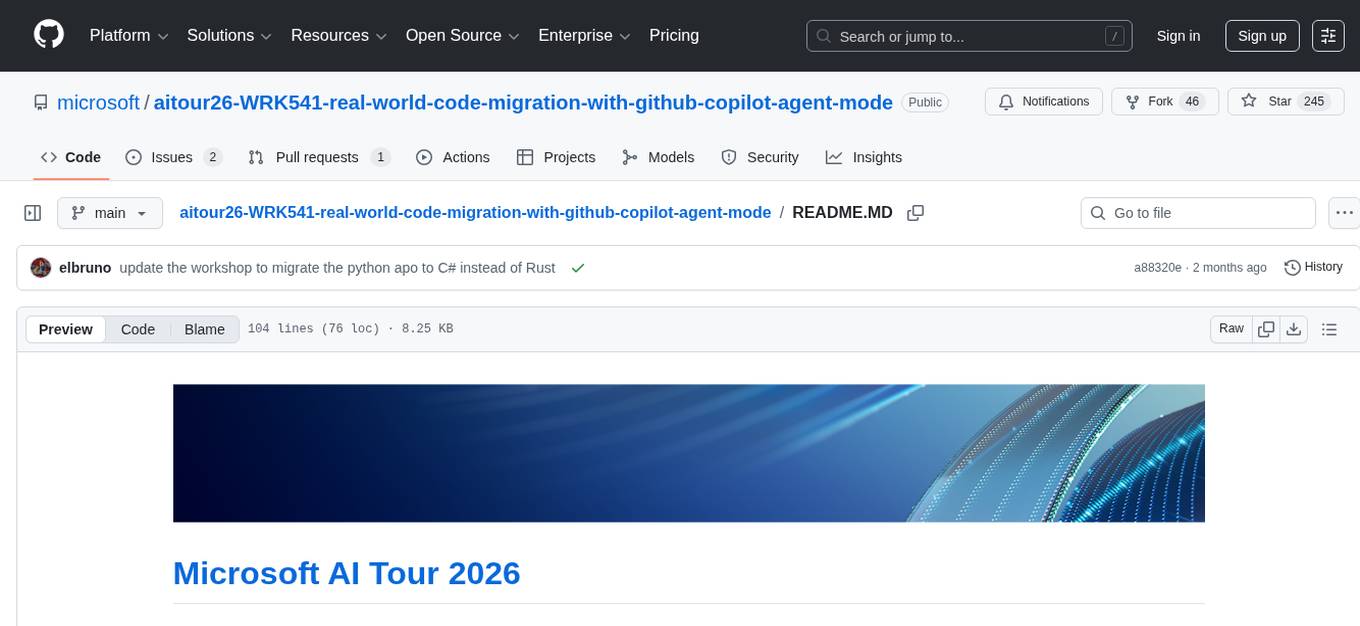
aitour26-WRK541-real-world-code-migration-with-github-copilot-agent-mode
Microsoft AI Tour 2026 WRK541 is a workshop focused on real-world code migration using GitHub Copilot Agent Mode. The session is designed for technologists interested in applying AI pair-programming techniques to challenging tasks like migrating or translating code between different programming languages. Participants will learn advanced GitHub Copilot techniques, differences between Python and C#, JSON serialization and deserialization in C#, developing and validating endpoints, integrating Swagger/OpenAPI documentation, and writing unit tests with MSTest. The workshop aims to help users gain hands-on experience in using GitHub Copilot for real-world code migration scenarios.
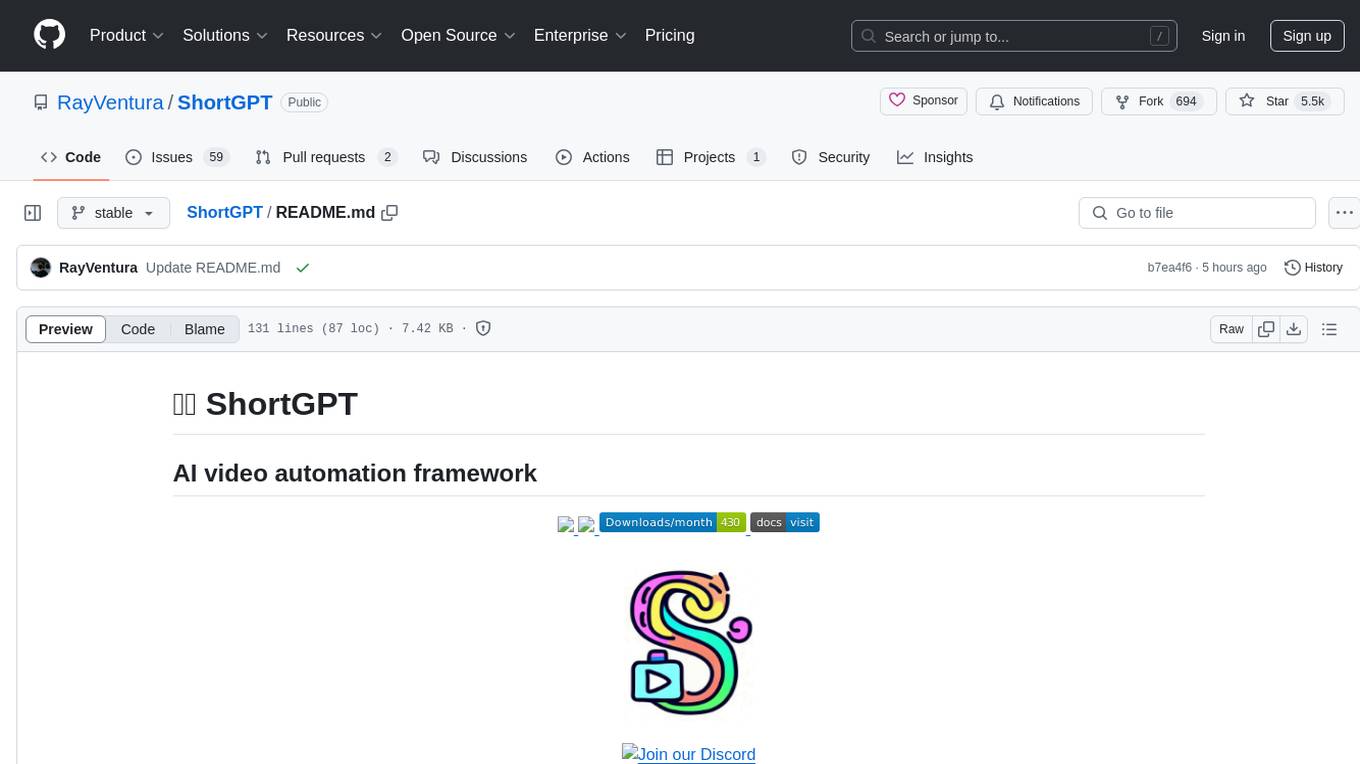
ShortGPT
ShortGPT is a powerful framework for automating content creation, simplifying video creation, footage sourcing, voiceover synthesis, and editing tasks. It offers features like automated editing framework, scripts and prompts, voiceover support in multiple languages, caption generation, asset sourcing, and persistency of editing variables. The tool is designed for youtube automation, Tiktok creativity program automation, and offers customization options for efficient and creative content creation.

supervisely
Supervisely is a computer vision platform that provides a range of tools and services for developing and deploying computer vision solutions. It includes a data labeling platform, a model training platform, and a marketplace for computer vision apps. Supervisely is used by a variety of organizations, including Fortune 500 companies, research institutions, and government agencies.

coze-studio
Coze Studio is an all-in-one AI agent development tool that offers the most convenient AI agent development environment, from development to deployment. It provides core technologies for AI agent development, complete app templates, and build frameworks. Coze Studio aims to simplify creating, debugging, and deploying AI agents through visual design and build tools, enabling powerful AI app development and customized business logic. The tool is developed using Golang for the backend, React + TypeScript for the frontend, and follows microservices architecture based on domain-driven design principles.
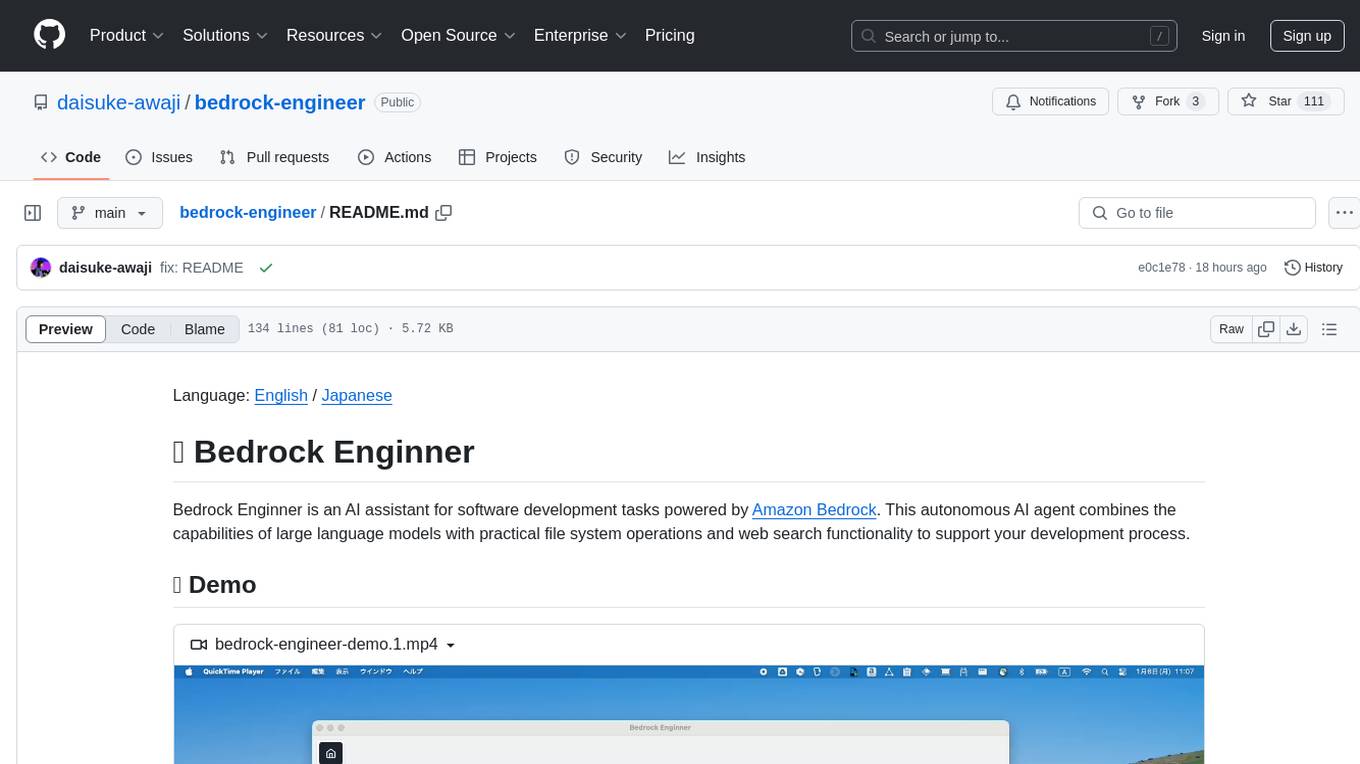
bedrock-engineer
Bedrock Engineer is an AI assistant for software development tasks powered by Amazon Bedrock. It combines large language models with file system operations and web search functionality to support development processes. The autonomous AI agent provides interactive chat, file system operations, web search, project structure management, code analysis, code generation, data analysis, agent and tool customization, chat history management, and multi-language support. Users can select agents, customize them, select tools, and customize tools. The tool also includes a website generator for React.js, Vue.js, Svelte.js, and Vanilla.js, with support for inline styling, Tailwind.css, and Material UI. Users can connect to design system data sources and generate AWS Step Functions ASL definitions.
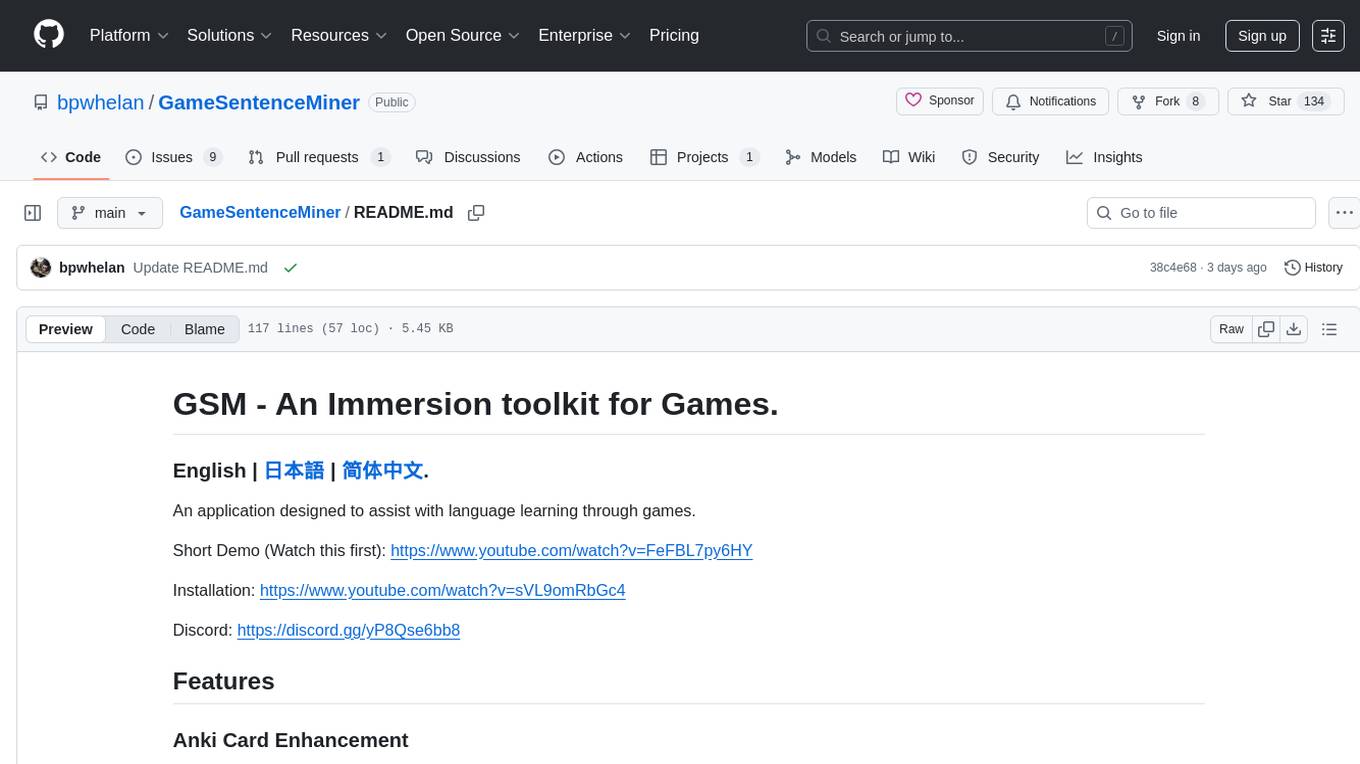
GameSentenceMiner
GameSentenceMiner (GSM) is an immersion toolkit designed to assist with language learning through games. It enhances Anki cards with automated audio capture, manual trim options, screenshot capture, multi-line support, and AI translation. Additionally, GSM offers OCR capabilities with easier setup, exclusion zones, two-pass OCR system, consistent audio timing, and support for multiple languages. The tool also features game launcher capabilities for simplifying game setup and launching. Basic requirements include an Anki card creation tool, a method of extracting text from games, and, of course, a game. GSM provides detailed documentation and FAQs to help users understand its functionality and troubleshoot any issues. Users can seek support through the project's Discord channel or by creating issues on the repository.
For similar tasks

bots
The 'bots' repository is a collection of guides, tools, and example bots for programming bots to play video games. It provides resources on running bots live, installing the BotLab client, debugging bots, testing bots in simulated environments, and more. The repository also includes example bots for games like EVE Online, Tribal Wars 2, and Elvenar. Users can learn about developing bots for specific games, syntax of the Elm programming language, and tools for memory reading development. Additionally, there are guides on bot programming, contributing to BotLab, and exploring Elm syntax and core library.
For similar jobs
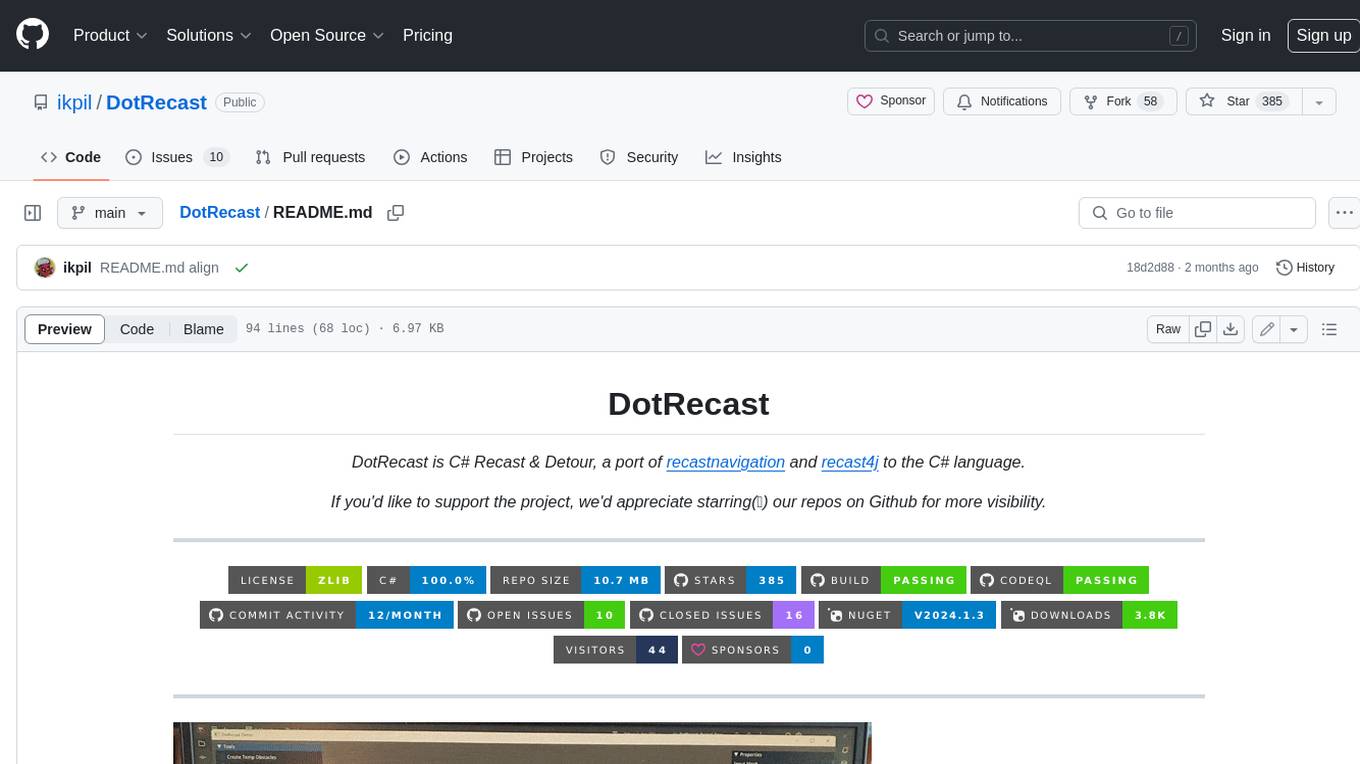
DotRecast
DotRecast is a C# port of Recast & Detour, a navigation library used in many AAA and indie games and engines. It provides automatic navmesh generation, fast turnaround times, detailed customization options, and is dependency-free. Recast Navigation is divided into multiple modules, each contained in its own folder: - DotRecast.Core: Core utils - DotRecast.Recast: Navmesh generation - DotRecast.Detour: Runtime loading of navmesh data, pathfinding, navmesh queries - DotRecast.Detour.TileCache: Navmesh streaming. Useful for large levels and open-world games - DotRecast.Detour.Crowd: Agent movement, collision avoidance, and crowd simulation - DotRecast.Detour.Dynamic: Robust support for dynamic nav meshes combining pre-built voxels with dynamic objects which can be freely added and removed - DotRecast.Detour.Extras: Simple tool to import navmeshes created with A* Pathfinding Project - DotRecast.Recast.Toolset: All modules - DotRecast.Recast.Demo: Standalone, comprehensive demo app showcasing all aspects of Recast & Detour's functionality - Tests: Unit tests Recast constructs a navmesh through a multi-step mesh rasterization process: 1. First Recast rasterizes the input triangle meshes into voxels. 2. Voxels in areas where agents would not be able to move are filtered and removed. 3. The walkable areas described by the voxel grid are then divided into sets of polygonal regions. 4. The navigation polygons are generated by re-triangulating the generated polygonal regions into a navmesh. You can use Recast to build a single navmesh, or a tiled navmesh. Single meshes are suitable for many simple, static cases and are easy to work with. Tiled navmeshes are more complex to work with but better support larger, more dynamic environments. Tiled meshes enable advanced Detour features like re-baking, hierarchical path-planning, and navmesh data-streaming.

bots
The 'bots' repository is a collection of guides, tools, and example bots for programming bots to play video games. It provides resources on running bots live, installing the BotLab client, debugging bots, testing bots in simulated environments, and more. The repository also includes example bots for games like EVE Online, Tribal Wars 2, and Elvenar. Users can learn about developing bots for specific games, syntax of the Elm programming language, and tools for memory reading development. Additionally, there are guides on bot programming, contributing to BotLab, and exploring Elm syntax and core library.

Half-Life-Resurgence
Half-Life-Resurgence is a recreation and expansion project that brings NPCs, entities, and weapons from the Half-Life series into Garry's Mod. The goal is to faithfully recreate original content while also introducing new features and custom content envisioned by the community. Users can expect a wide range of NPCs with new abilities, AI behaviors, and weapons, as well as support for playing as any character and replacing NPCs in Half-Life 1 & 2 campaigns.
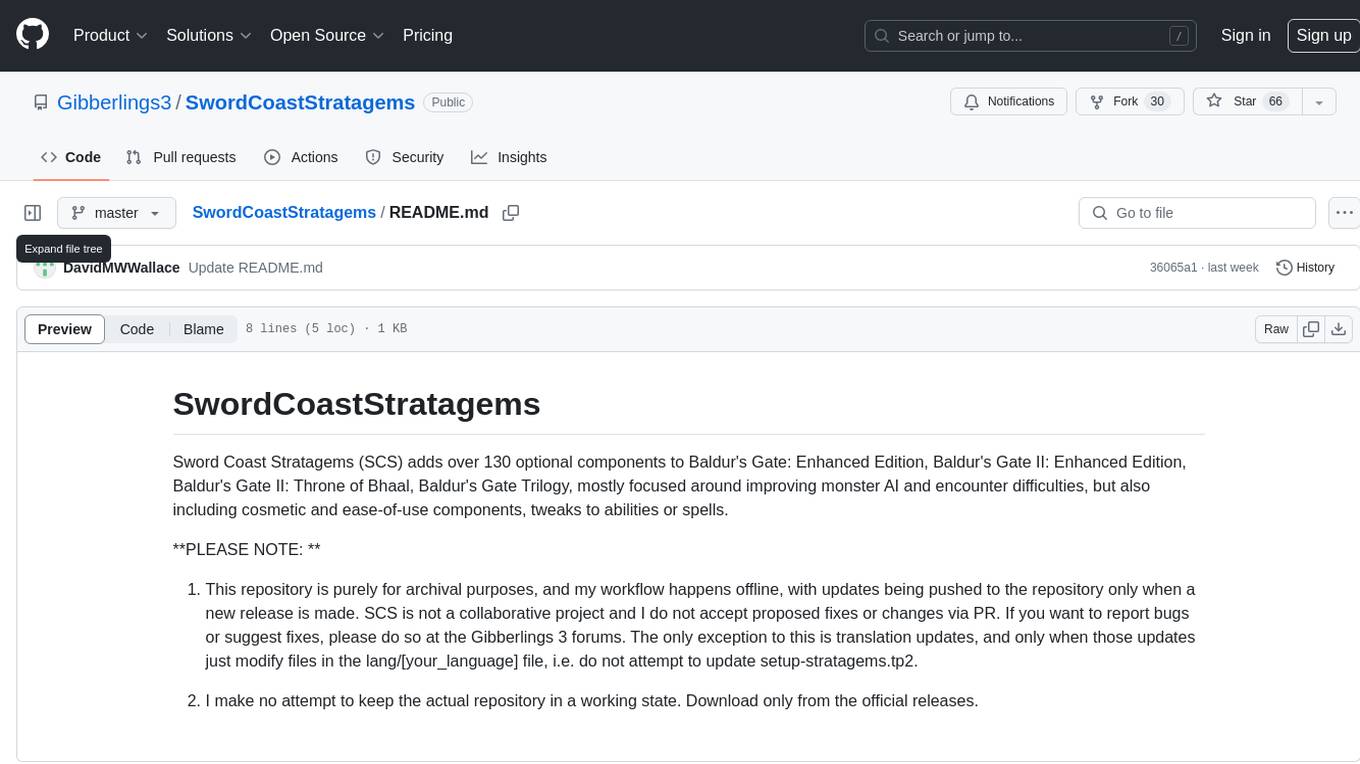
SwordCoastStratagems
Sword Coast Stratagems (SCS) is a mod that enhances Baldur's Gate games by adding over 130 optional components focused on improving monster AI, encounter difficulties, cosmetic enhancements, and ease-of-use tweaks. This repository serves as an archive for the project, with updates pushed only when new releases are made. It is not a collaborative project, and bug reports or suggestions should be made at the Gibberlings 3 forums. The mod is designed for offline workflow and should be downloaded from official releases.
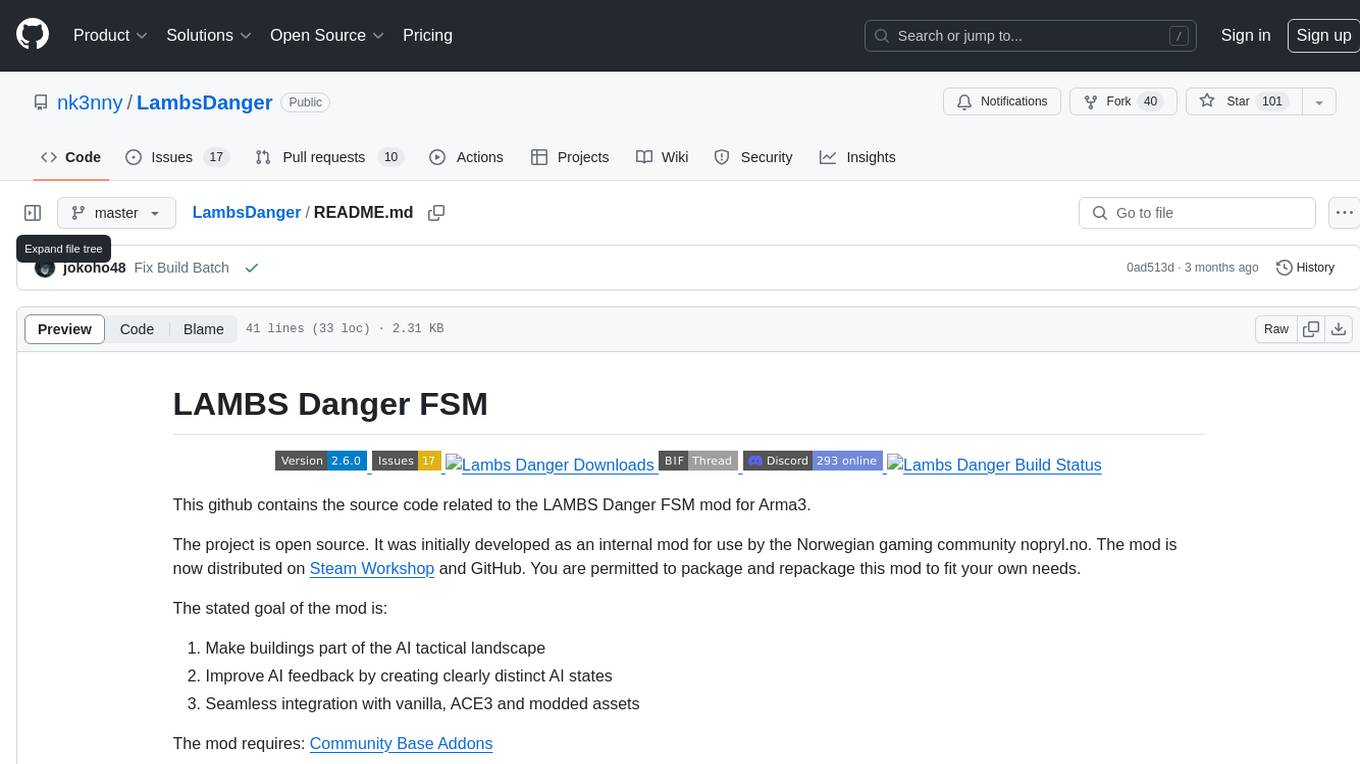
LambsDanger
LAMBS Danger FSM is an open-source mod developed for Arma3, aimed at enhancing the AI behavior by integrating buildings into the tactical landscape, creating distinct AI states, and ensuring seamless compatibility with vanilla, ACE3, and modded assets. Originally created for the Norwegian gaming community, it is now available on Steam Workshop and GitHub for wider use. Users are allowed to customize and redistribute the mod according to their requirements. The project is licensed under the GNU General Public License (GPLv2) with additional amendments.

beehave
Beehave is a powerful addon for Godot Engine that enables users to create robust AI systems using behavior trees. It simplifies the design of complex NPC behaviors, challenging boss battles, and other advanced setups. Beehave allows for the creation of highly adaptive AI that responds to changes in the game world and overcomes unexpected obstacles, catering to both beginners and experienced developers. The tool is currently in development for version 3.0.
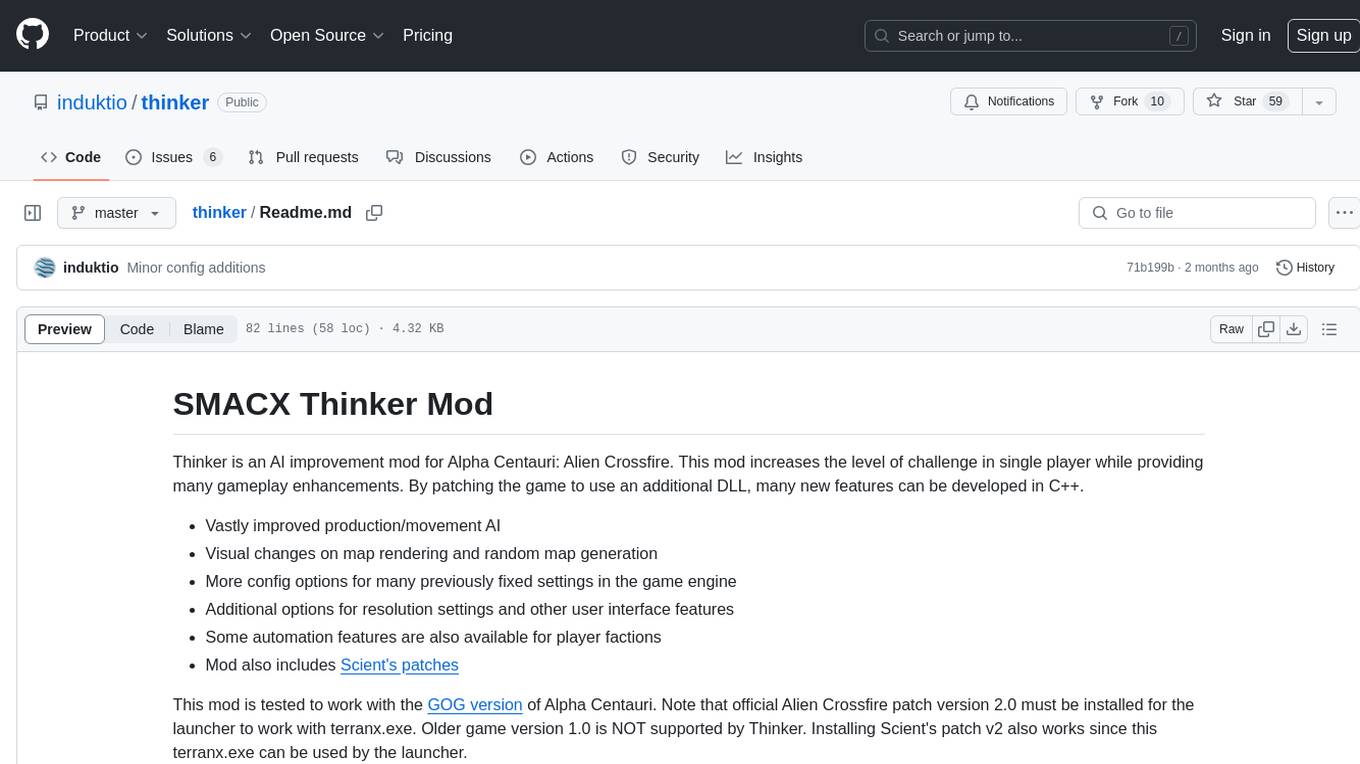
thinker
Thinker is an AI improvement mod for Alpha Centauri: Alien Crossfire that enhances single player challenge and gameplay with features like improved production/movement AI, visual changes on map rendering, more config options, resolution settings, and automation features. It includes Scient's patches and requires the GOG version of Alpha Centauri with the official Alien Crossfire patch version 2.0 installed. The mod provides additional DLL features developed in C++ for a richer gaming experience.
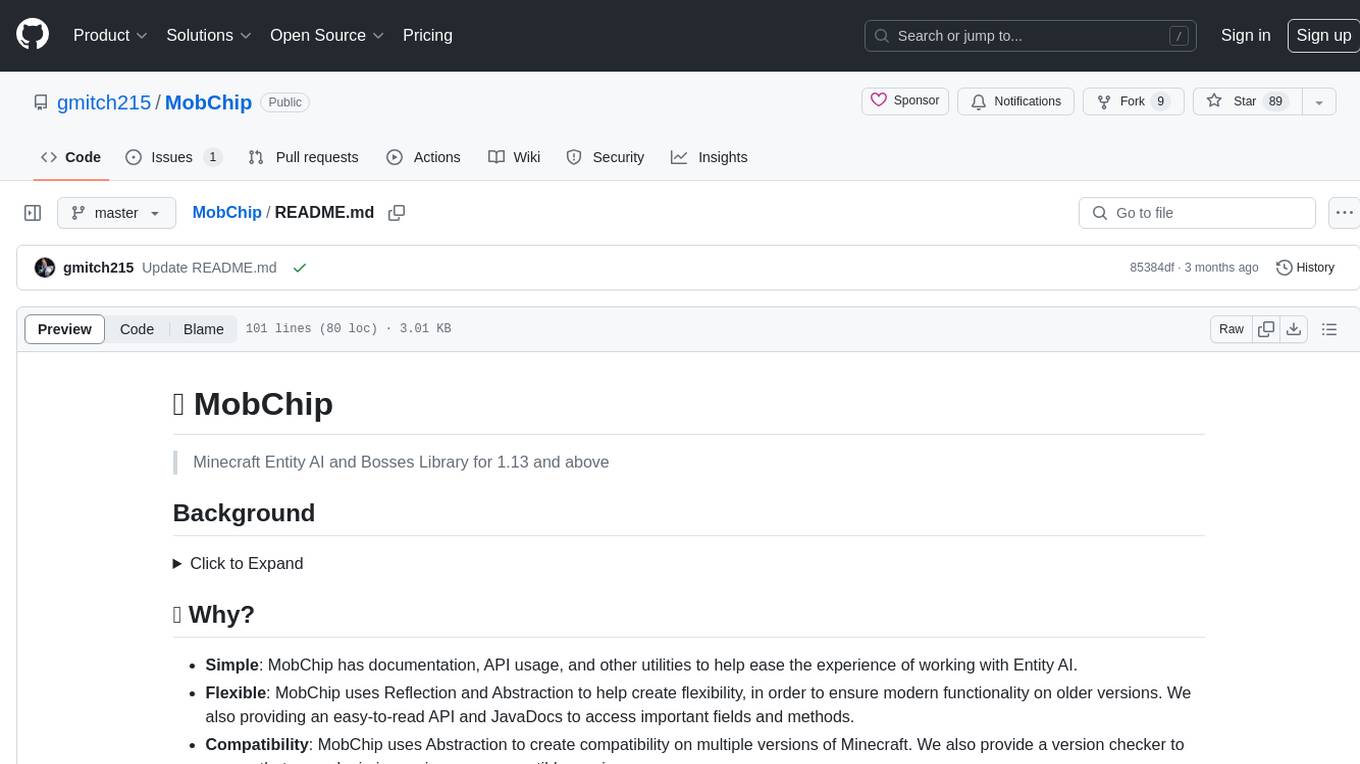
MobChip
MobChip is an all-in-one Entity AI and Bosses Library for Minecraft 1.13 and above. It simplifies the implementation of Minecraft's native entity AI into plugins, offering documentation, API usage, and utilities for ease of use. The library is flexible, using Reflection and Abstraction for modern functionality on older versions, and ensuring compatibility across multiple Minecraft versions. MobChip is open source, providing features like Bosses Library, Pathfinder Goals, Behaviors, Villager Gossip, Ender Dragon Phases, and more.